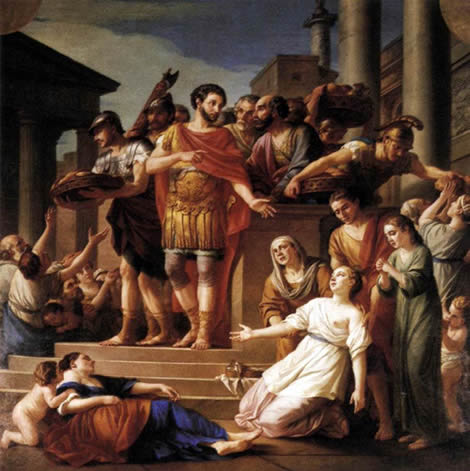 |
| Marcus Aurelius distributing bread |
Marcus Aurelius was the only Roman philosopher king, author of Meditations and last of the “good” emperors. The Pax Romana began its slow collapse during his reign. Marcus Aurelius Antoninus Augustus was born on April 26 in 121 c.e.
His father, praetor Marcus Annius Verus, died when Aurelius was only three months old, and his mother, Lucilla, inherited great family wealth. Emperor Hadrian felt great empathy toward Aurelius, and Hadrian became his mentor. He made Aurelius a priest of the Salian order in 128.
By age 12 Aurelius began to practice Stoicism and became extremely ascetic, scarcely sleeping and eating. Hadrian controlled his education, having Rome’s brightest citizens tutor Aurelius. He studied rhetoric and literature under M. Cornelius Fronto, who taught him Latin and remained a mentor for life. In 136 Aurelius met Apollonius the Stoic.
  |
Hadrian adopted Aurelius in 138, and he was given the title caesar in 139. Realizing his death was approaching, Hadrian arranged for the future emperor Antoninus Pius (86–161 c.e.) to adopt Aurelius along with Lucius Verus (130–169 c.e.), who became Aurelius’s adoptive brother, making them joint heirs to succession.
Aurelius was betrothed in 135 to Annia Galeria Faustina, the younger daughter of Antoninus Pius and Annia Galeria Faustina the Elder. They married in 141 and had 14 children in 28 years of marriage. Only five of their children, one son, the weak and unstable Commodus (161–192), and four daughters would survive to adulthood.
By 147 Aurelius gained the power of tribunicia potestas, and he shared these powers with Pius. Aurelius was admitted to the Senate and held consulships in 140, 145, and 161 c.e., a rare honor for a private citizen. Marcus Aurelius and Lucius Verus became co-emperors on March 7, 161.
As co-emperors, Verus conducted battles in the east while Aurelius concentrated on fighting the ever-increasing threat from the German tribes in the north. Aurelius spent the majority of his reign fighting against the encroachment of the formidable German tribes that opposed Roman rule. Aurelius fought the Marcomanni and the Quadi, who settled in northern Italy, and the Parthenians, who moved into the east of the Roman Empire.
 |
| Marcus Aurelius statue |
Marcus Aurelius instituted positive reform in various elements of Roman society, including changes to Roman civil law. Upon the advice of the revered jurist Quintus Ceridius Scaevola he abolished inhumane criminal laws and severe sentencing. In family law he alleviated the absolute patriarchy fathers held over their children.
Aurelius granted women equal property rights and the right to receive property on behalf of children. He created the equivalent of modern-day trust companies enabled to distribute parental/family legacies at the age of majority. Realizing the value of children in Roman society, Aurelius endowed orphanages and hospitals.
In the military he allowed promotion only through merit. During the numerous economic crises of his reign Aurelius refused to raise taxes and used his own wealth many times to cover the financial stress caused by continuous warfare. He also debased the silver coinage several times.
Returning legions serving under the command of Verus (who died in 169) brought plague to Rome from the East. Excessive and repeated flooding destroyed the granaries, leading to starvation. Avidius Cassius (130–175), believing Aurelius was dead, unsuccessfully attempted to seize the throne in 175.
He had little support once people realized Aurelius was still alive. His own men murdered him. Realizing the tragedy of Cassius’s error, Aurelius would allow no harm to come to Cassius’s family. The troops that Cassius had commanded once again brought plague back from the East.
During his campaigns Aurelius wrote his 12 books of Meditations in Greek, detailing his reflections of life. His wife Faustina died in 175 at age 45. By 177 he allowed the self-indulgent Commodus full participation in his government. Aurelius died on March 17, 180 c.e., in Vindobona, present-day Vienna, at age 58.
